- Home
- Duncan James
Their Own Game
Their Own Game Read online
THEIR OWN GAME
by
Duncan James
Published by Duncan James
Copyright 2012 Duncan James
***
***
CHAPTER ONE – THE FIRST TO FALL
CHAPTER TWO – IN THE BEGINNING
CHAPTER THREE – MEANWHILE, IN WASHINGTON
CHAPTER FOUR – THE SEED IS SOWN
CHAPTER FIVE – THE BRIEFING
CHAPTER SIX – SPECIAL RELATIONS
CHAPTER SEVEN – THE HAWAII FORMULA
CHAPTER EIGHT – SPREADING THE NET
CHAPTER NINE - IGNITION
CHAPTER TEN – LIFT OFF
CHAPTER ELEVEN - A PROCESS OF ELIMINATION
CHAPTER TWELVE – ONLY THE MOST TRUSTWORTHY
CHAPTER THIRTEEN – THE PRIME MINISTER’S STATEMENT
CHAPTER FOURTEEN – THE ENVELOPE
CHAPTER FIFTEEN – DOUBLE BEDS AND DOUBLE AGENTS
CHAPTER SIXTEEN – ANOTHER LIFE.
***
CHAPTER ONE – THE FIRST TO FALL
Major Bill Clayton, dressed in civvies, leant against the bookstall in the main concourse of Belfast’s International airport, going through the motions of selecting something to read. From where he stood, he had a good view of Martin McFosters, surrounded by journalists in front of the check-in desk, briefing them before he left. One of Clayton’s men was among the press corps, tape recorder in hand, listening intently.
Clayton, and his opposite numbers in Special Branch, liked to keep an eye McFosters, but didn’t usually bother to see him off on his travels. They knew that this trip was to be something rather different, though. Not that McFosters had any idea. Clayton looked across to his police colleague, sipping coffee from a polystyrene cup. The coffee was awful: it usually was, but he, too, had a good view of McFosters. No one seemed to notice that there were more than usual armed police milling around.
McFosters was off to do more talking. Off to America, which remained the main source of cash for the Republicans as it had been since before the troubles began. A large part of America, and not just the Irish-Americans, shared the Nationalist view that the British should quit Northern Ireland and their oppressive rule, and that the two halves of the island should be united once again into a single community.
From time to time, influential voices in the States had sought to bring pressure on Westminster, and on Dublin, in an effort to bring this about. It has to be said, too, that influential voices in the States were not averse to putting pressure on McFosters from time to time, either, and this visit was likely to be one of those occasions.
His briefing finally finished, Martin McFosters turned to pass through the check-in desk. Clayton and his colleagues glanced briefly at one another in acknowledgement that their role at the airport was over, and made their separate ways towards the car park and their offices. There were calls to be made, but on secure phones, not mobiles. They were too easy to intercept.
McFosters passed through immigration, suffered the indignities of baggage and personal security searches, and made his way to the first class lounge. He was alone this time. It had been made clear to him previously, in the nicest possible way, of course, that Stateside fund-raising efforts were not designed to allow him and half a dozen of his top people to swan around the world in luxury. So this time he went alone. But he insisted on travelling first class, just the same. He was, after all, President of Sinn Fein, and an elected member of both the European and the British Parliaments. And he had previously been invited across, not just to attend and speak at fund-raising dinners, but also to meet senior senators from both houses, and even, once, to meet the President of the United States himself. So first class it was - both his own financial people and the generous American donors had at least agreed that.
But he still didn’t like the Boeing 747 - not even the new, stretched version. Comfortable perhaps, especially in the upper cabin, but the food was predictable, the movies generally boring, and the whole journey just that bit too long, what with the lengthy check-in procedures and all. And there was a limit to how much free champagne even he could sensibly consume.
He didn't really like flying at all, to be honest. He wished he could persuade his people that he should travel via London for a change, but he knew it wasn’t even worth thinking about, even though their coffers were swollen with more cash than they would ever need, short of all-out war. They wouldn’t even let him save time going by Concorde when that was in service. But he couldn’t afford not to go when invited, although he had to admit that the excitement of visiting America after so many years of isolation had gone. This was the third time in as many months that he'd made the dreary journey to update sympathetic senators on the latest twists and turns of the British Government. They were keen to know what progress was being made, and found it hard to believe that, after all the apparently positive, if slow, movement there had been through the peace process, things now appeared to be stalled again.
For years, the President of Sinn Fein and his immediate lieutenants had been isolated from mainstream politics, not least because of their association with, and in some cases, parallel membership of, the IRA. Martin McFosters was not alone in this. The leadership of the political wings of the Protestant paramilitaries were in the same boat. Those who supported terrorism were never likely to be taken seriously by the political parties who existed because of the ballot box, rather than because of the bullet and the bomb.
Slowly, though, that had changed. Now, with power sharing in Northern Ireland, McFosters and others had a voice. Their power-base was reinforced by the ballot box as well. To some extent, they had been able to quell the violence through a series of cease-fires, which had been more or less maintained. They had undertaken to use their influence over the IRA, which they had always claimed was not born of a direct link, to work towards ‘decommissioning’ stockpiles of weapons, through an independent body which was actually powerless to do anything except talk. Protestants and Catholics alike had dragged their feet over this, and other issues, and both sides of the political divide also had to deal with militant members who still believed that violence, rather than talking, was more likely to bring progress.
But talking there still was, and plenty of it. And there was violence, too, in spite of the many concessions that had been made in the continuing effort to bring peace to the troubled Province. Rather too much violence, in fact. McFosters had to admit that it was making his life more difficult than he would have wished.
This visit was about money. He must make sure he kept up the pressure for the continued flow of funds, and make sure, too, that those whose political support might be wavering, understood that nothing could be achieved, in peace or war, without very substantial amounts of cash. Certainly more than could be raised through the normal methods on the Irish side of the Atlantic. Protection rackets, drugs, prostitution, crime and so on had their value, but the US dollar was available in much greater quantities than they could ever raise, through the huge and influential Irish American population.
It had certainly always been readily available in seemingly endless sums in the past, although there had been one incident, very recently, when urgently needed cash had not been transferred with the usual speed. At one time, a clerk in the branch of the Manhattan State Bank, where several million dollars was held anonymously, had even claimed that the account had been closed. Of course, it hadn’t, but several attempts had to be made at other US banks before the required sum was eventually put together and moved to one of their many accounts in Ireland. A cock-up somewhere that would eventually be sorted out, but if anything, it had proved that McFosters’ oft proposed and always rejected idea that some of their huge wealth should be invested, had been ill advised. Cash in a ba
nk was like notes under the mattress - quickly and easily available.
The States had always been the main source of cash for the republican movement, ostensibly to keep Sinn Fein’s political efforts alive, although only the most naive would pretend that the steady flow of dollars had not also gone towards buying arms and keeping the IRA going as well. And they were still there, and still needed cash support. Weapons that, in theory at least, had been put beyond use by the decommissioning process, had to be replaced, and those remaining, stored and maintained. NORAID understood this, although for some inexplicable reason, parts of the US administration appeared not to. They believed that their support of Sinn Fein was bolstering the republican’s political efforts, and that was what this visit was all about - American support for the republican dream of unification.
But he would find it difficult to explain to his Senate supporters that there was, in reality, no longer a peace process at all. His friends in the Real IRA had seen to that. The shock of the first devastating bomb in London's Docklands was followed quickly by the assassination of a Cabinet Minister and then bloodshed at Twickenham during the England v. Wales six nations game. Political dialogue over many months and years had not taken things forward as fast as some had hoped and others had wanted, so the militant hot-heads had decided to put a little pressure on things to help the talks along.
It had put the nationalist cause back on the front pages of the world's press, all right, but somehow it wasn't quite having the effect they had all hoped for, any more than it had in the past. Impact, yes. Results - well, perhaps it was a bit early for the changes in attitude to materialise. More time, and more incidents, then we'll see. McFosters was not himself convinced, and he knew that friendly senators weren’t either, so this could be one of his more difficult visits. Perhaps it was as well he was on his own, although he could see that a bit of support in the few days ahead might very well be welcome.

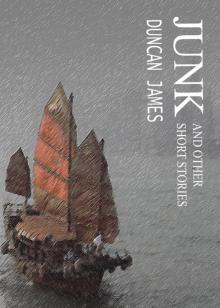 JUNK and other short stories
JUNK and other short stories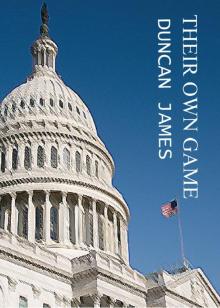 Their Own Game
Their Own Game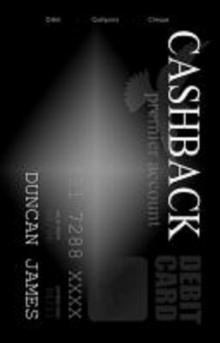 Cashback
Cashback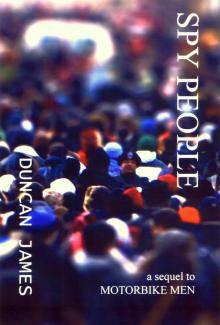 Spy People
Spy People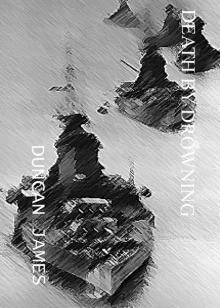 Death By Drowning
Death By Drowning Take Me Home
Take Me Home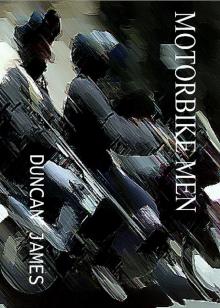 Motorbike Men
Motorbike Men